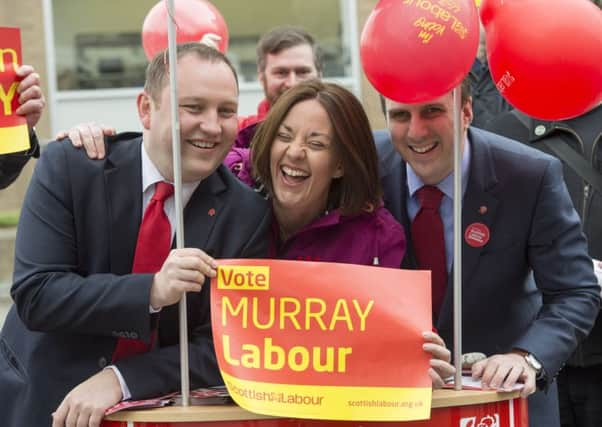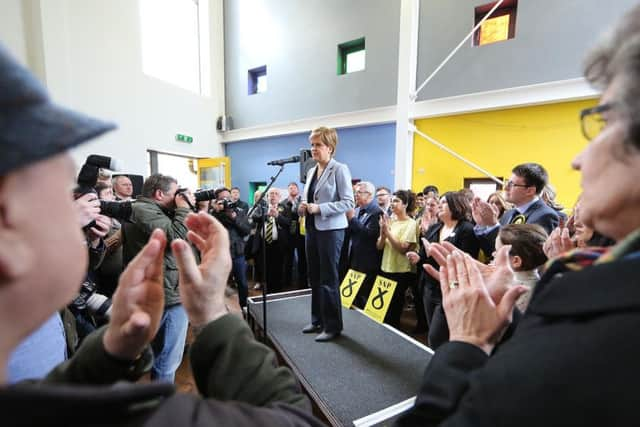Labour on the verge of losing its last Scottish bastion


The once iron grip of Labour over Glasgow City Council is loosening as Scotland goes to the polls this week for local elections that are expected to see the party founded by Keir Hardie summarily rejected in its traditional heartlands.
There could hardly be a more potent symbol of Scotland’s shifting political landscape than the toppling of one of the last citadels of Labour domination.
Advertisement
Hide AdAdvertisement
Hide AdThe beneficiaries of this landmark moment will be the SNP, the party which over recent years has been picking up disaffected Labour votes all over the city and has profited from the seismic activity of the political earthquakes that have erupted in Scotland.


“We think we are on track to achieve our target of at the least being the biggest party and I think we may well have an overall majority within our grasp,” said Susan Aitken, the leader of the SNP group on the council, as she took a break from pounding the streets trying to bolster support for her party.
If her prediction proves correct, Aitken will have pulled off a major coup for the SNP which will give Nicola Sturgeon momentum as the country contemplates the really big contest – the 8 June snap general election.
Assuming the SNP takes over from Labour in Glasgow, it would be a totemic moment that reflects Labour’s demise as a serious force and seals the SNP’s domination of politics not only at national level but at local level.
The positive effect on nationalist morale should not be underestimated as the SNP attempts to defend its massive general election victory of two years ago.


“Winning in Glasgow would definitely help us ahead of the general election,” said Aitken.
“It would help us to keep on doing campaigning for another four weeks with a spring in our step.”
But with polls suggesting that Sturgeon’s call for another independence referendum is playing badly on the ground, is Aitken’s confidence misplaced?
Advertisement
Hide AdAdvertisement
Hide Ad“Any slippage that I have encountered, talking to people who were previously SNP supporters, has been absolutely marginal and I am hearing that across the city,” said Aitken, bullishly.
“Candidates are telling me it is not a major issue on the doorsteps at all. It will be an issue for people who are not SNP supporters and are not independence supporters. It may well doubly confirm their opposition to the SNP. But that’s not unexpected.”
John Curtice, professor of politics at Strathclyde University and one of the country’s leading political scientists, is more circumspect. According to him, it is a “tough ask” for the SNP to win Glasgow outright.
To win a majority, a party has to take 43 of the 85 council seats – a considerable leap given that the nationalists currently have 30. But the prospect of the SNP emerging as the largest party is very real.
“Even with the SNP vote going up – Glasgow looks like a tough ask in terms of getting a majority as opposed to being the largest party,” said Curtice.
“You have got to be north of 45 per cent of the vote in order to get a majority. I think they got just over one third last time. It would be a really good story for the SNP if they gained control of Glasgow, as opposed to being the largest party and maybe being a few seats short.”
But with 53.49 per cent of Glasgow voting Yes in the 2014 independence referendum – albeit on a vastly increased turnout – one can see where Aitken’s optimism comes from.
Should she fail to win an outright majority, she talks confidently of leading a minority administration. With a deal with the Tories ruled out, she believes she can seek consensus on an issue by issue basis.
Advertisement
Hide AdAdvertisement
Hide AdIf the question of the SNP winning a majority still has to be answered, the fate of Labour, in a city where it used to be joked that they weighed rather than counted their votes, is more certain.
Curtice believes it will be a dismal local election for the party, which is set to lose the city for the first time in almost four decades.
“To put it bluntly, it would be absolutely astonishing if the Labour Party hangs on to Glasgow. Given all the evidence we have got, you can’t possibly see how the party can do it,” he said.
The evidence Curtice was talking about was a formidable piece of work he has done for the Electoral Reform Society (ERS), published today, which predicts gains for the SNP, Tories and even Greens and a heavy drop in Labour support.
The parlous state of Labour is reflected in Curtice’s analysis, which points out that the party is fielding 44 fewer candidates than it did in 2012. In Glasgow, Labour has put up two fewer candidates despite there being six more seats to be won.
As a result, every single one of the 43 Labour candidates has to win a seat under the proportional representation system in order to achieve a majority – an almost impossible task.
Even if the SNP does not do as well as Aitken predicts, Nicola Sturgeon’s party is still on course to displace Labour as the dominant force in Scottish municipal politics.
As Curtice’s ERS report notes: “Even if the party’s [SNP’s] advance were to be more modest, including perhaps as a result failing to become the largest party in Edinburgh and Glasgow, the party could still be the largest group on up to 18 councils.
Advertisement
Hide AdAdvertisement
Hide Ad“Either way, it seems quite possible that the Nationalists will become the principal party of Scottish local government, the one level of the country’s politics that it does not currently dominate, an outcome that would boost further the party’s grip on the governance of Scotland.”
Adding spice to the SNP/Labour battle on the streets of Glasgow is the rise of the Conservatives.
There have been some notable exceptions such as the Thatcherite Glasgow Cathcart MP Teddy Taylor, but it is fair to say that the city of Red Clydeside has never really been associated with the Tories.
Nevertheless, there is the potential for the Conservatives to make inroads into hostile territory this time around. Indeed Labour strategists are privately admitting the Tories could run them close in the battle for second place.
“The Tories might succeed in taking seats in some relatively non-affluent parts of the city, where they are basically picking up the Unionist vote,” said Curtice.
“The local elections could give the Tories a foothold back in places like Glasgow where they have not had a foothold in 20 years.”
With the Conservatives relentlessly targeting the anti-independence vote and positioning themselves as doughty opponents of a second independence referendum, their star is in the ascendant.
And as they come out of obscurity and into the cut and thrust of Glasgow politics, their rise is also creating more than a few problems for the SNP in terms of the national picture.
Advertisement
Hide AdAdvertisement
Hide AdRecent polls are suggesting that Ruth Davidson’s party could take as many as seven Westminster seats from the SNP. So even if the SNP manages to achieve a totemic result in Glasgow as well as increase its representation on other local authorities, it does not necessarily translate into unfettered nationalist joy on 8 June.
“Winning Glasgow would be a psychological boost for the SNP, but if the Tories come second they will also get a psychological boost,” said Curtice.
Meanwhile, Frank McAveety, the sitting Labour leader of Glasgow City Council, is battling on gamely.
If he is worried that defeat in Glasgow is the prelude to more Labour embarrassment in the general election and yet more questions over the leadership of Jeremy Corbyn and Kezia Dugdale, he does not show it.
His pitch to the voters is that he will continue to champion Glasgow and is keen to promote Labour’s record in Glasgow while attacking the SNP’s.
“It is Nicola Sturgeon’s government which has passed on and accelerated the cuts. The people of Glasgow have had enough of Brexit, indyref and councils and councillors who just do what they are told by Nicola,” said McAveety.
He takes comfort from the fact that Labour managed to stay in power during the last council elections in 2012.
McAveety is still hoping Labour can get enough support to form a minority administration. So much so that in a city which is no stranger to tribal rivalries on the football pitch, McAveety’s position is that he won’t countenance any coalition deals in an attempt to keep a shaky grip on power.
McAveety is sticking with Labour. The problem for him is that the voters are not.